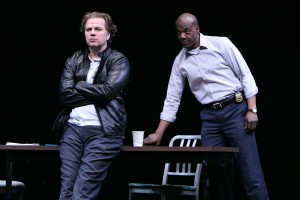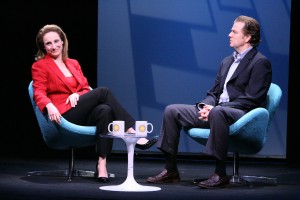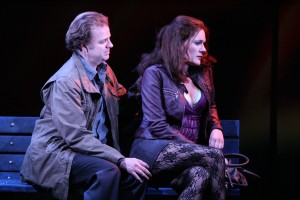
HAVING YOUR CAKE AND CHOKING ON IT
There is, at the heart of Neil LaBute’s The Break of Noon, an implicit cry to build slowly in a rising arc and, hopefully, toward a rousing crescendo. But, while his director, Jo Bonney, has found a way to jolt us from scene to scene, she has not unlocked the door to the play itself. A jolt may work once, maybe twice, but, by the third (and fourth and fifth) time, it has become a gimmick. The play gets stubbornly stuck in its tracks, despite the directorial insistence that it keep moving forward.
The premise is promising: a neer-do-well survives a horrible mass murder and, because he has survived, imagines that God has spoken to him. He tries to convince everyone that he is sincere but he keeps running into the brick wall of his own blighted past at every turn. Of course, even in his holy state, the man can’t resist the temptation to exploit his own holiness for reasons that would be frowned upon in a man really courting saintliness. This, it seems, would be ideal material for LaBute, who has a way of getting inside the heads of some pretty unpleasant people. But the complexity of the play is still in the author’s head; what is on stage needs serious fleshing out.  Nothing LaBute writes is without value, but he is becoming to the theater what Joyce Carol Oates has become to literature, someone who maybe writes too much. After the brilliance and the compassion of reasons to be pretty and Wrecks, one expects more from LaBute. There is something somewhat slovenly about the writing of the central character. The edge we’ve become accustomed to in his work appears briefly in a scene or two or three, in some of the characters our man comes in contact with on his journey to salvation.
Nothing LaBute writes is without value, but he is becoming to the theater what Joyce Carol Oates has become to literature, someone who maybe writes too much. After the brilliance and the compassion of reasons to be pretty and Wrecks, one expects more from LaBute. There is something somewhat slovenly about the writing of the central character. The edge we’ve become accustomed to in his work appears briefly in a scene or two or three, in some of the characters our man comes in contact with on his journey to salvation.
 But he is not helped by his actors. It might even be said that Ms. Bonney, who knows her way around performance art, has not quite grasped how to create an ensemble to which there is a certain uniformity of style. John Earl Jenks, in the double roles of lawyer and detective, is crisp and direct; Catherine Dent is quietly and darkly naturalistic as the ex-wife and the ex-mistress of the wayward hero; Tracy Chimo, as a television interviewer and as a prostitute posing as a French maid, is closer to caricature than character – and annoyingly so – in both roles. These actors are in three different plays. At the center is Kevin Anderson (who was a powerful Doc Delaney in a recent Broadway revival of Come Back, Little Sheba),
But he is not helped by his actors. It might even be said that Ms. Bonney, who knows her way around performance art, has not quite grasped how to create an ensemble to which there is a certain uniformity of style. John Earl Jenks, in the double roles of lawyer and detective, is crisp and direct; Catherine Dent is quietly and darkly naturalistic as the ex-wife and the ex-mistress of the wayward hero; Tracy Chimo, as a television interviewer and as a prostitute posing as a French maid, is closer to caricature than character – and annoyingly so – in both roles. These actors are in three different plays. At the center is Kevin Anderson (who was a powerful Doc Delaney in a recent Broadway revival of Come Back, Little Sheba),  who starts off too casually and, though he is plausible enough at portraying the man’˜s growing confusion, ends by just not having either the charisma or the evangelical zeal that might have brought the play, even with its flaws, to a satisfying conclusion.
who starts off too casually and, though he is plausible enough at portraying the man’˜s growing confusion, ends by just not having either the charisma or the evangelical zeal that might have brought the play, even with its flaws, to a satisfying conclusion.
The problem with The Break of Noon is that it doesn’t live up to its promise. My guess is that, if LaBute doesn’t give up on it, it may one day pop up again and contain the genuine surprise LaBute is capable of providing. The surprise in this production looks more like a trick. Genuineness must be earned.
harveyperr @ stageandcinema.com
photos by Michael Lamont
The Break of Noon
scheduled to close March 6 at time of publication
for tickets, visit http://geffenplayhouse.com/
